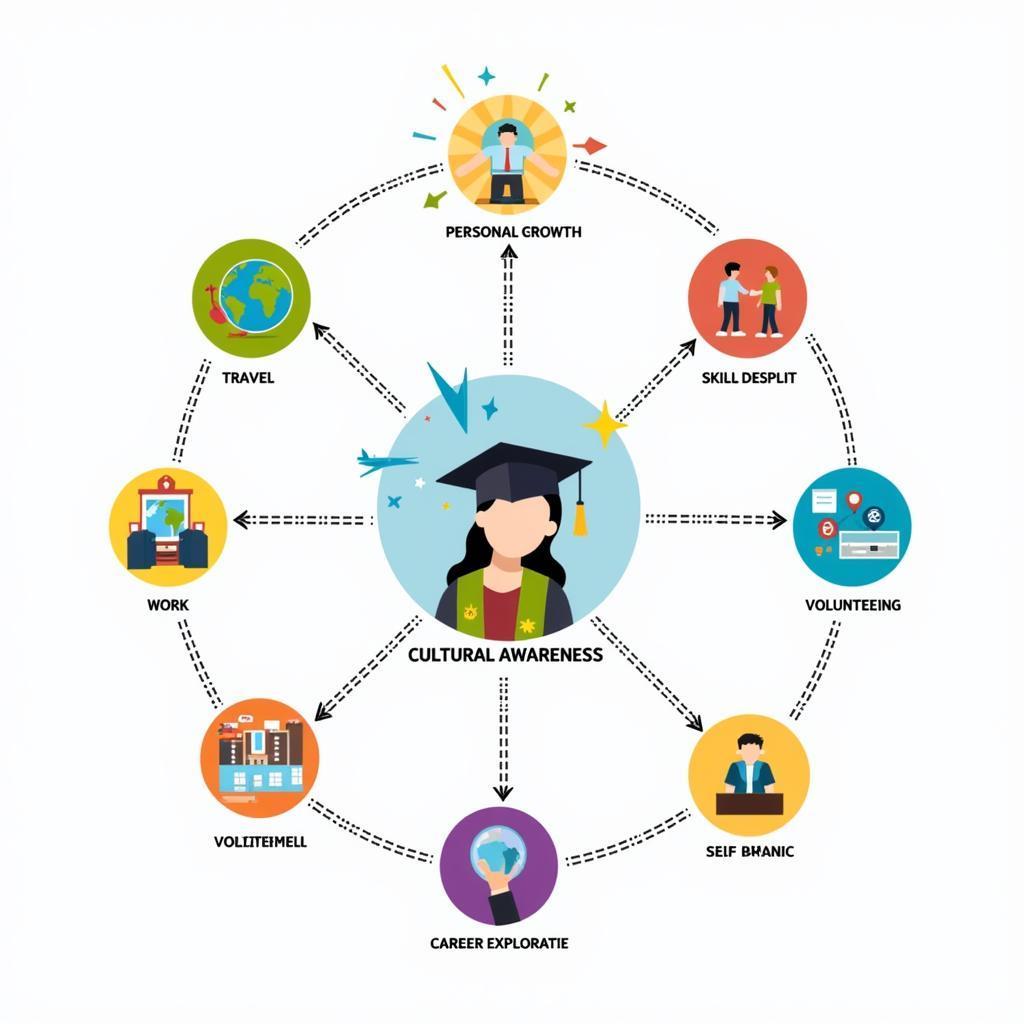The topic of gap years for young people has been a recurring theme in IELTS Writing Task 2 exams. Based on past exam trends and analysis of various IELTS preparation websites, this subject appears frequently and is likely to continue being a popular choice for future tests. Let’s examine a relevant question that has appeared in recent IELTS exams:
Some people believe that young people should be encouraged to take a year off to work or travel between finishing high school and starting university studies. Others think this is a waste of time. Discuss both views and give your own opinion.
Analyzing the Question
This question asks candidates to discuss two contrasting viewpoints on the topic of gap years for young people. The key elements to address are:
- The benefits of taking a gap year (working or traveling)
- The drawbacks of taking a gap year (waste of time)
- Your personal opinion on the matter
It’s crucial to cover both perspectives equally before presenting your own stance in the conclusion.
Sample Essay 1 (Band 8-9)
In recent years, the concept of taking a gap year between high school and university has gained popularity among young people. While some argue that this practice should be encouraged, others consider it a waste of time. This essay will examine both viewpoints before presenting my own perspective on the matter.
Proponents of gap years argue that this break provides valuable life experiences and personal growth opportunities. By working or traveling, young individuals can develop essential skills such as independence, adaptability, and cultural awareness. These experiences can help them make more informed decisions about their future academic and career paths. Furthermore, a gap year can offer a much-needed respite from the pressures of formal education, allowing students to recharge and approach their university studies with renewed enthusiasm and focus.
On the other hand, critics contend that taking a year off can be detrimental to a young person’s academic and professional progress. They argue that the interruption in studies may lead to a loss of academic momentum and make it challenging to readjust to the rigors of university life. Additionally, there are concerns that some students might lose sight of their educational goals or face financial setbacks during this period. From this perspective, it is more advantageous for young people to proceed directly to higher education and maintain their academic trajectory.
In my opinion, while I acknowledge the potential risks, I believe that the benefits of a well-planned gap year outweigh the drawbacks. The maturity and life skills gained during this time can significantly enhance a student’s university experience and future career prospects. However, it is crucial that young people approach their gap year with clear objectives and a structured plan to ensure they make the most of this opportunity.
In conclusion, the decision to take a gap year is a personal one that depends on individual circumstances and goals. While it may not be suitable for everyone, encouraging young people to consider this option can lead to more well-rounded and self-aware individuals entering higher education.
 Gap year benefits for young people in education and career
Gap year benefits for young people in education and career
Sample Essay 2 (Band 6-7)
The idea of taking a gap year between finishing high school and starting university is becoming more common these days. Some people think it’s a good idea, while others believe it’s not useful. This essay will look at both sides of this argument.
Those who support gap years say it can be very helpful for young people. Working or traveling for a year can teach them important life skills and make them more independent. They can learn about different cultures and maybe even find out what they really want to study at university. Also, it can be a good break from studying, which might help them feel more ready for university later.
However, other people think a gap year is just wasting time. They worry that students might forget what they learned in school or find it hard to start studying again after a year off. There’s also a risk that some young people might decide not to go to university at all after their gap year. Some parents are concerned about the cost of a gap year and think it’s better for their children to go straight to university.
In my opinion, I think a gap year can be a good idea if it’s planned well. The experiences people have during this time can help them grow as a person and maybe even help them in their future studies and career. But I also think it’s important for young people to have a clear plan for their gap year and not just see it as a long holiday.
To conclude, whether a gap year is a good idea or not depends on the individual person. While it has some risks, it can also bring many benefits if it’s done in the right way.
 Students planning gap year activities and goals
Students planning gap year activities and goals
Sample Essay 3 (Band 5-6)
Nowadays, many young people want to take a year off after high school before going to university. Some people think this is a good idea, but others don’t agree. I will talk about both sides in this essay.
People who like the idea of a gap year say it’s good for young people. They can work and earn money or travel to new places. This can help them learn new things and become more grown-up. They might also find out what they really want to study at university.
But some people think a gap year is not good. They say it’s just wasting time and students might forget what they learned in school. They think it’s better to go straight to university and finish studying quickly. They also worry that it costs a lot of money to travel or live without going to school.
I think a gap year can be good if the person plans it well. They should have goals for what they want to do and learn. But if someone just wants to have fun and not do anything useful, then maybe it’s not a good idea.
In conclusion, taking a gap year can be good or bad depending on how the person uses it. It’s important to think carefully before deciding to take a year off.
 Gap year experiences: work, travel, and volunteer opportunities
Gap year experiences: work, travel, and volunteer opportunities
Explanation of Band Scores
Band 8-9 Essay:
- Fully addresses all parts of the task with a well-developed response
- Presents a clear position throughout the essay
- Uses a wide range of vocabulary with very natural and sophisticated control
- Uses a wide range of complex structures with full flexibility and accuracy
- Has excellent coherence and cohesion, using a variety of cohesive devices effectively
Band 6-7 Essay:
- Addresses all parts of the task, though some parts may be more fully covered than others
- Presents a relevant position, though the conclusions may become unclear or repetitive
- Uses an adequate range of vocabulary for the task, with some inaccuracies
- Uses a mix of simple and complex sentence forms
- Has generally good coherence and cohesion, though with some lapses
Band 5-6 Essay:
- Addresses the task only partially, with limited development of ideas
- Expresses a position but the development is not always clear
- Uses a limited range of vocabulary, with some errors that may cause difficulty for the reader
- Uses mainly simple sentences with limited accuracy in more complex structures
- Has some coherence and cohesion, but overall organization can be improved
Key Vocabulary to Remember
-
Gap year (noun) – /ɡæp jɪər/ – A period, typically an academic year, taken by a student as a break between secondary school and higher education.
-
Proponents (noun) – /prəˈpəʊnənts/ – People who advocate for or support a theory or course of action.
-
Cultural awareness (noun phrase) – /ˈkʌltʃərəl əˈweənəs/ – Understanding and appreciation of different cultures and cultural differences.
-
Academic momentum (noun phrase) – /ækəˈdemɪk məˈmentəm/ – The continuity and progress in one’s studies.
-
Well-rounded (adjective) – /wel ˈraʊndɪd/ – Having a personality that is fully developed in all aspects.
-
Self-aware (adjective) – /self əˈweə/ – Having conscious knowledge of one’s own character and feelings.
-
Adaptability (noun) – /əˌdæptəˈbɪləti/ – The quality of being able to adjust to new conditions or environments.
-
Rigors (noun) – /ˈrɪɡəz/ – The demanding or harsh conditions or elements of something.
-
Trajectory (noun) – /trəˈdʒektəri/ – A path, progression, or line of development.
-
Recharge (verb) – /riːˈtʃɑːdʒ/ – To regain energy or spirit.
In conclusion, the topic of gap years for young people remains a relevant and thought-provoking subject for IELTS Writing Task 2. As you prepare for your exam, consider practicing with similar topics such as:
- The benefits and drawbacks of internships before starting a career
- The importance of work experience versus formal education
- The value of travel in personal development
We encourage you to write your own essay on the topic provided in this article and share it in the comments section for feedback and discussion. This practice will help you refine your writing skills and prepare effectively for the IELTS Writing Task 2.


